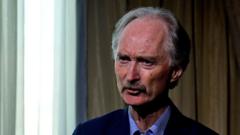National Security Adviser Jake Sullivan affirmed intentions to broker a deal in December following meetings with Israeli leaders, acknowledging challenges that remain in reaching an agreement between the opposing parties in the ongoing conflict.
U.S. Pushes for Gaza Cease-Fire Amid Renewed Diplomacy Efforts

U.S. Pushes for Gaza Cease-Fire Amid Renewed Diplomacy Efforts
As U.S. officials engage with Israeli and Hamas leaders, hopes for a cease-fire and hostage negotiations show signs of progress.
In an effort to bring an end to hostilities in the Gaza Strip, U.S. National Security Adviser Jake Sullivan expressed optimism during a recent press briefing in Tel Aviv regarding the possibility of concluding a cease-fire agreement and securing the release of hostages by the end of the month.
Sullivan outlined a sense of renewed momentum in negotiations that had previously stalled, stating that the “surround sound of these negotiations is different today than it has been in the past.” His comments followed discussions with Israeli Prime Minister Benjamin Netanyahu and top security officials, emphasizing that, while progress is being made, the prospects of finalizing a deal remain uncertain.
He noted that efforts to negotiate a cease-fire have become increasingly urgent after months of deadlock, despite previous rounds producing little success. Analysts warn that optimism should be tempered since both Israel and Hamas have previously held each other accountable for failed negotiations.
Sullivan plans to visit Qatar and Egypt, significant players in mediating this complex negotiation alongside the United States. He acknowledged the necessity of continued diplomatic engagement, highlighting both sides' political will as a crucial factor in moving forward.
Moreover, he confirmed that Netanyahu is eager to see tangible advancements, highlighting indications of possible flexibility from Hamas regarding some of its longstanding demands. The road to peace, however, remains fraught with challenges, and Sullivan cautioned that until agreements are finalized, expectations should remain tempered.
While the international community remains focused on the humanitarian crisis unfolding in Gaza, the hope is that renewed diplomatic efforts may herald a breakthrough in achieving a temporary cessation of hostilities, with long-term peace remaining a distant aspiration.
Sullivan outlined a sense of renewed momentum in negotiations that had previously stalled, stating that the “surround sound of these negotiations is different today than it has been in the past.” His comments followed discussions with Israeli Prime Minister Benjamin Netanyahu and top security officials, emphasizing that, while progress is being made, the prospects of finalizing a deal remain uncertain.
He noted that efforts to negotiate a cease-fire have become increasingly urgent after months of deadlock, despite previous rounds producing little success. Analysts warn that optimism should be tempered since both Israel and Hamas have previously held each other accountable for failed negotiations.
Sullivan plans to visit Qatar and Egypt, significant players in mediating this complex negotiation alongside the United States. He acknowledged the necessity of continued diplomatic engagement, highlighting both sides' political will as a crucial factor in moving forward.
Moreover, he confirmed that Netanyahu is eager to see tangible advancements, highlighting indications of possible flexibility from Hamas regarding some of its longstanding demands. The road to peace, however, remains fraught with challenges, and Sullivan cautioned that until agreements are finalized, expectations should remain tempered.
While the international community remains focused on the humanitarian crisis unfolding in Gaza, the hope is that renewed diplomatic efforts may herald a breakthrough in achieving a temporary cessation of hostilities, with long-term peace remaining a distant aspiration.



















